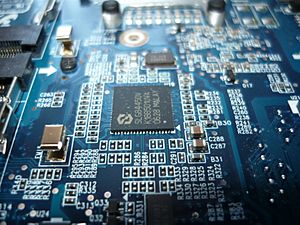Electronic engineering facts for kids
Electronic engineering is a fascinating field of engineering that explores how to use electricity and magnetism to make things work. Electronic engineers are like inventors and problem-solvers. They design electronic circuits, build computer systems, and create 'smart' devices. Think about robot controls, airplane autopilots, or even your smartphone – electronic engineers help make them! They also work with radio waves, which help us communicate wirelessly.
Contents
A Brief History of Electronic Engineering
The term "electronic engineering" became popular in the late 1950s. Before World War II, this field was often called "radio engineering." Back then, if you wanted to study it at a university, it was usually part of a physics degree.
Over time, new electronic devices were invented. This made the field much bigger! It grew to include things like radar, television, and audio systems (like Hi-Fi). Later, computers and tiny microprocessors came along. By the mid to late 1950s, "radio engineering" slowly changed its name to "electronic engineering." It then became its own special subject you could study at university.
What Do Electronic Engineers Do?
Electronic engineers work on many different projects. They are the people who design the "brains" of electronic devices.
Designing Electronic Circuits
One of their main jobs is to design electronic circuits. These are like the roads and highways for electricity inside a device. They make sure electricity flows correctly to power everything from a simple light bulb to a complex computer chip.
Building Computer Systems
Electronic engineers are also very important in building computer systems. They design the hardware, which is the physical part of the computer. This includes the motherboard, the processor, and all the other parts that make your computer or phone work.
Creating Control Systems
They also develop control systems. These are systems that manage and control how other machines or processes work. For example, an electronic engineer might design the autopilot for an airplane. This system helps the plane fly smoothly and safely. They also work on embedded systems, which are small computer systems built into larger devices, like the ones in your car or washing machine.
Skills Needed for Electronic Engineering
To become an electronic engineer, you need to be good at science and mathematics. These subjects help engineers understand how electrical systems work. They use math to calculate how much power is needed or how fast a signal will travel. Physics helps them understand the basic rules of electricity and magnetism.
Today, most engineering work involves using computers. Electronic engineers often use special computer-aided technologies to help them design and test their systems. This makes their work more accurate and efficient.
See also
 In Spanish: Ingeniería electrónica para niños
In Spanish: Ingeniería electrónica para niños
 | Victor J. Glover |
 | Yvonne Cagle |
 | Jeanette Epps |
 | Bernard A. Harris Jr. |


